- Home
- Judy Blume
Smart Women
Smart Women Read online
Praise for the novels of Judy Blume
Wifey
“An excellent novel . . . I’m still in shock.”—The Cleveland Plain Dealer
“It works perfectly . . . wit, pathos, and the ring of real life.”—Los Angeles Examiner
“A very likable heroine . . . a nice, upper-middle-class housewife with a very dirty mind . . . Hide it where the children won’t see it.”—The Cincinnati Enquirer
Summer Sisters
“An exceptionally moving story that can leave the reader laughing and crying . . . sometimes at the same time.”—The Denver Post
“Compulsively readable . . . her powers are prodigious.”—The New York Times Book Review
“As warm as a summer breeze blowing through your hair, as nostalgic as James Taylor singing ‘How Sweet It Is.’ You remember. So does Judy Blume. How sweet it was.”—Chicago Tribune
books by judy blume
For Adults
Wifey
Smart Women
Summer Sisters
For Young Adults
Forever . . .
Tiger Eyes
Letters to Judy: What Kids Wish They Could Tell You
Places I Never Meant to Be: Original Stories by Censored Writers
(edited by Judy Blume)
For Young Readers
The Pain and the Great One
The One in the Middle Is the Green Kangaroo
Freckle Juice
The Fudge Books
Tales of a Fourth Grade Nothing
Otherwise Known as Sheila the Great
Superfudge
Fudge-a-Mania
Double Fudge
Blubber
Iggie’s House
Starring Sally J. Freedman as Herself
Are You There God? It’s Me, Margaret
It’s Not the End of the World
Deenie
Then Again, Maybe I Won’t
Just as Long as We’re Together
Here’s to You, Rachel Robinson
THE BERKLEY PUBLISHING GROUP
Published by the Penguin Group
Penguin Group (USA) Inc.
375 Hudson Street, New York, New York 10014, USA
Penguin Group (Canada), 90 Eglinton Avenue East, Suite 700, Toronto, Ontario M4P 2Y3, Canada (a division of Pearson Penguin Canada Inc.)
Penguin Books Ltd., 80 Strand, London WC2R 0RL, England
Penguin Group Ireland, 25 St. Stephen’s Green, Dublin 2, Ireland (a division of Penguin Books Ltd.)
Penguin Group (Australia), 250 Camberwell Road, Camberwell, Victoria 3124, Australia (a division of Pearson Australia Group Pty. Ltd.)
Penguin Books India Pvt. Ltd., 11 Community Centre, Panchsheel Park, New Delhi—110 017, India
Penguin Group (NZ), Cnr. Airborne and Rosedale Roads, Albany, Auckland 1310, New Zealand (a division of Pearson New Zealand Ltd.)
Penguin Books (South Africa) (Pty.) Ltd., 24 Sturdee Avenue, Rosebank, Johannesburg 2196,
South Africa
Penguin Books Ltd., Registered Offices: 80 Strand, London WC2R 0RL, England
This is a work of fiction. Names, characters, places, and incidents either are the product of the author’s imagination or are used fictitiously, and any resemblance to actual persons, living or dead, business establishments, events, or locales is entirely coincidental. The publisher does not have any control over and does not assume any responsibility for author or third-party websites or their content.
Copyright © 1983 by Judy Blume.
“Introduction” copyright © 2004 by Judy Blume.
Cover design copyright © by Honi Werner.
Text design by Stephanie Huntwork.
The author gratefully acknowledges permission from Holt, Rinehart and Winston, Publishers, the Estate of Robert Frost, and Jonathan Cape Ltd. to quote from “Stopping by Woods on a Snowy Evening” from The Poetry of Robert Frost, edited by Edward Connery Lathem. Copyright 1923, © 1969 by Holt, Rinehart and Winston. Copyright 1951 by Robert Frost.
All rights reserved.
No part of this book may be reproduced, scanned, or distributed in any printed or electronic form without permission. Please do not participate in or encourage piracy of copyrighted materials in violation of the author’s rights. Purchase only authorized editions.
BERKLEY is a registered trademark of Penguin Group (USA) Inc.
The “B” design is a trademark belonging to Penguin Group (USA) Inc.
PRINTING HISTORY
G. P. Putnam’s Sons hardcover edition / November 2004
Berkley trade paperback edition / October 2005
ISBN: 978-1-101-57256-6
The Library of Congress has catalogued the G. P. Putnam’s Sons hardcover edition as follows:
Blume, Judy.
Smart women / Judy Blume.
p. cm.
ISBN 0-399-15236-9
1. Women—Colorado—Fiction. 2. Female friendship—Fiction. 3. Boulder (Colo.)—Fiction.
4. Divorced women—Fiction. 5. Single mothers—Fiction. I. Title.
PS3552.L843S6 2004 2004048841
813’.54—dc22
To Ruth Kovnat
A smart woman and dear friend.
Thank you for being there for me.
Table of Contents
Cover
Also By Judy Blume
Title Page
Copyright
Dedication
Introduction
Part 1
1
2
3
4
5
6
7
8
9
10
11
12
13
14
15
Part 2
16
17
18
19
20
21
22
23
24
25
26
27
28
29
Part 3
30
31
32
33
34
35
36
37
38
39
40
41
42
43
Part 4
44
45
46
47
48
Special Preview
introduction
IN 1979, I WAS DIVORCED and living in Santa Fe, New Mexico, with two teenagers. I was thankful for my work, but convinced I would never find a lasting love relationship when, bam!—it hit me all over again. Falling in love at forty (or any age) is s’wonderful, just like the song says. But this time around you bring all that baggage with you, not to mention your kids, who might not think it’s all as romantic as you do. What teenager wants to know anything about mom’s or dad’s sex life?
This was the seed that started me writing Smart Women.
When I began to write the book, I planned to tell the story from the adults’ viewpoint only, and although there would be kids in it, this time I wasn’t going to take their side. I hoped my daughter and son would understand. But once I got going, I fell in love with both Sara and Michelle, the daughters, respectively, of the two main characters, B.B. and Margo. I had to let them have their say. They provide the humor and poignancy i
n the story.
While my children were growing up I was careful not to use them in my books—careful of their privacy. But my daughter believes that Michelle is based on her (when she was that age) and maybe she’s right. Maybe that’s why Michelle is my favorite character in the book. I love her vulnerability. I love her for giving her mother a hard time because she cares about her and can’t bear to see the family painfully disrupted again. Is there any relationship more complicated than that of mothers and daughters, especially when mom is divorced and dating?
Smart Women takes place in the early eighties, a time when some of us thought we could have it all. We celebrated what we called our freedom. I’m not sure what we thought personal freedom meant, but it certainly included sexual freedom (this was before we knew the dangers of sexually transmitted diseases, including AIDS). Freedom was a word we bandied about, telling ourselves we deserved it, we’d worked long and hard to get it. Freedom didn’t mean freedom from responsibility, because we had children and most of us cared deeply about them. Maybe it meant freedom to make our own decisions, to make our own mistakes. There’s a scene in the book in which Margo sits in the bathtub singing the lyrics Kris Kristofferson made famous: “Freedom’s just another word for nothin’ left to lose.” But is that what we really believed?
Sure, we were proud of our work, proud we could support ourselves, and we weren’t about to stay in bad marriages. Why should we? (Just look at the statistics: Our generation married young and divorced often.) But when it came right down to it, most of us still wanted a man in the house, a man in our bed—just not the man we married the first time. We wanted one of those new and enlightened types, the kind we’d been reading about. But who were these men? Where were they? In Margo’s case, he’s the ex-husband of her new friend and he’s come to town to spend time with his young daughter.
Of course, everyone who knew me assumed the story was all true since George, the man in my life, was the former husband of a new friend. (She’s the one who fixed us up: How civilized is that? How eighties?) But all the characters in the book (okay, except for some parts of Michelle) are fictional. Really!
Once I started writing Smart Women I realized I needed to set it outside Santa Fe. I needed a town that wouldn’t intrude on my story. Santa Fe was too strong a setting and besides, we lived there; our children went to school there. Until then, I’d never set a book in a place I didn’t know well. My friends were anxious to help in my quest for the perfect setting, sharing their enthusiasm for Mendocino, Port Townsend, and Telluride. George and I checked out their suggestions, but none of them felt right. It was my secretary, who had come to Santa Fe from Boulder, who thought that that university town might be just the place I was looking for. And she was right. We spent a week there chatting with everyone and taking photos of houses, offices, galleries, and restaurants. I needed to imagine Margo and B.B. at home and at work, and the kids at school. I kept those photos on my desk for more than a year as I wrote the book.
When the book was published I held my breath waiting for letters from readers in Boulder telling me I’d gotten it all wrong. I was sure they were thinking it, even if they didn’t write to tell me. I learned how uncomfortable it is for me to set a book in a place I don’t know intimately, and I’ll never do it again. I like to think I can always spot a writer who doesn’t really know his or her location.
Right up to the last minute, the book had no title. This wasn’t an unusual situation for me, but it’s one that’s always made me anxious. Years earlier, my editor had called to say he was presenting my new children’s book at sales conference the next day and he needed a title by morning. Talk about pressure! That book became Starring Sally J. Freedman as Herself. A real mouthful. I wanted a simple title for this novel. I spent days poring over the text of the book, searching for just the right phrase, but I couldn’t come up with anything. George suggested Secondhand Man. It was catchy but I agonized over it. Is that how I wanted my readers to think of Margo’s new love? And wouldn’t that make Margo and B.B. secondhand women? Oh, the tossing and turning over book titles! Instead, I settled on Smart Women, which comes from a line in the book: “How come smart women like us keep falling in love with schmucks?” Not exactly romantic.
On my book tour I was asked again and again what the title meant. Tired of explaining, I finally gave up and said, “It means the women in the book are smart.” Not everyone agreed. Especially men. I heard from plenty of them. They blamed Margo and B.B. for everything that had gone wrong in their lives. Some blamed them for the ills in the world. But there were a few who said that from then on, they were going to pay more attention to their children. Some said they might even pay more attention to their wives. I hope they did.
And I hope you enjoy this story of a new love complicated by old relationships. From what I see in my own family, as well as what I hear about from others, falling in love the second time around hasn’t changed at all (except for Internet dating). I doubt it ever will. That’s good news, right?
Oh, and just so you know—George and I will celebrate twenty-five years together this fall. I’d like to think Margo had a chance at that, too.
JUDY BLUME
June 30, 2004
part one
1
MARGO SLID OPEN THE GLASS DOOR leading to the patio outside her bedroom. She set the Jacuzzi pump for twenty minutes, tested the temperature of the water with her left foot, tossed her robe onto the redwood platform, then slowly lowered herself into the hot tub, allowing the swirling water to surround her body.
The late August night air was clear and crisp. The mountains were lit by an almost full moon. The only sounds were Margo’s own breathing and the gentle gurgling of the water in the tub. She inhaled deeply to get the full aroma of the cedar as it steamed up, closed her eyes, and felt the tensions of the day disappear.
“Margo . . .”
The voice, coming out of the stillness of the night, startled her. She looked around, but all she saw were the barrels of overgrown petunias and geraniums surrounding the hot tub. She never remembered to pick off the dead flowers, but that didn’t stop them from flourishing.
“Over here . . .” the voice said.
He was standing on the other side of her weathered wood fence. She could barely see him.
“What are you doing?” she asked sharply.
“Just wondering if you’d like to have a drink. I’m Andrew Broder. I’m staying in the house next door.”
“I know who you are,” Margo snapped. “Didn’t anyone ever tell you it’s impolite to spy on your neighbor?”
“I’m not spying,” he said.
“And that eleven is too late to come over for a drink?”
“Is it?” he asked.
“Yes, it is.”
“I’m a night person,” he said. “It feels early to me.”
“Well, it’s not. Some of us have to get up and go to work in the morning.” She expected him to apologize and then to leave. She looked away. Certainly she was curious about him but no more so than any of her friends’ ex-husbands. Last Saturday she had seen him struggling with grocery bags. As he had walked from his truck to his house one had torn and everything had come crashing out, including a carton of eggs. Margo had watched from her upstairs deck, where she’d been reading. He’d stood there quietly, shaking his head and muttering. Then he’d cleaned up the mess, climbed back into his truck, and an hour later had returned with two more bags of groceries.
And on Sunday she’d heard him laughing with his daughter, Sara. She’d thought how nice it is for a father to enjoy his kid that way. And then she’d felt a pang because she never heard her kids laughing with Freddy anymore. She didn’t even know if they did laugh together.
“Look,” he said, and Margo realized that he was still standing by the fence. “Francine said that . . .�
�
“Francine?”
“I guess you call her B.B. . . . she said that if I needed to borrow sugar I could ask you.”
“Is that what you want then, sugar at eleven o’clock at night?”
“No,” he said. “I told you, I thought we could have a drink.” He held up a bottle.
“What is it?” Margo asked. “It’s dark. I can’t see that far.”
“Courvoisier. I’ve got the glasses too.”
Margo laughed. “You’re certainly prepared, aren’t you?”
“I try to be.”
“The gate’s unlatched,” she said.
And then another voice went off in her head. Margo, Margo . . . what are you doing?
I’m not doing anything.
Bullshit.
Look, he’s not a killer, he’s not a rapist, I know that much.
You know more than that. You know why you shouldn’t let him in.
It’s just for a drink.
I’ve heard that before.
I’m just being neighborly.
Some people never learn.
He opened the gate and walked across the small yard to the hot tub. He sat down at the edge and poured them each a drink. “To neighbors,” he said, lifting his glass.
“It’s dangerous to drink in a hot tub,” Margo told him. “The alcohol does something . . . it can kill you.” She dipped her tongue into the glass, tasting the brandy, then set it down. Her body was submerged in the foaming water and the steam had made her black hair curl and mat around her face.
“You look different up close,” he said.
“Up close?”
“I’ve seen you a few times, walking from your car to your house.”
“Oh.” So, he’d been watching her too.
“You look like the girl on the Sun-Maid raisin box.”
“I’m hardly a girl.”

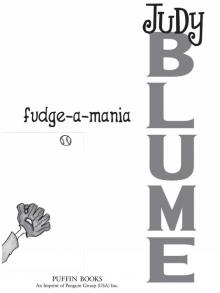 Fudge-a-Mania
Fudge-a-Mania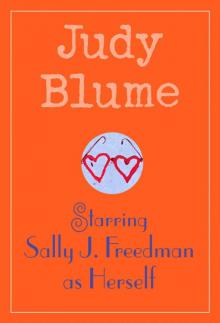 Starring Sally J. Freedman as Herself
Starring Sally J. Freedman as Herself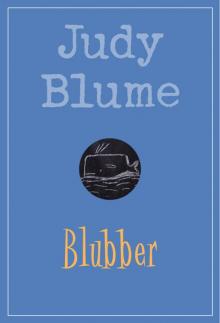 Blubber
Blubber Otherwise Known as Sheila the Great
Otherwise Known as Sheila the Great Are You There God? It's Me, Margaret
Are You There God? It's Me, Margaret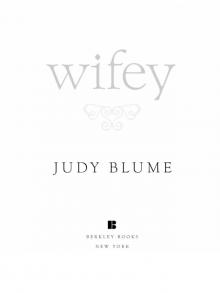 Wifey
Wifey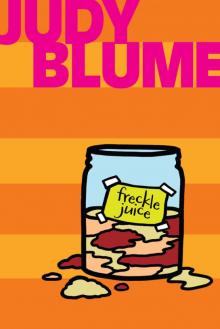 Freckle Juice
Freckle Juice Just as Long as We're Together
Just as Long as We're Together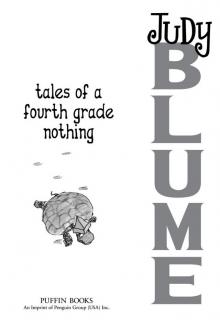 Tales of a Fourth Grade Nothing
Tales of a Fourth Grade Nothing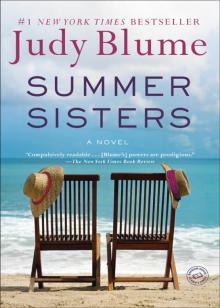 Summer Sisters
Summer Sisters Then Again, Maybe I Won't
Then Again, Maybe I Won't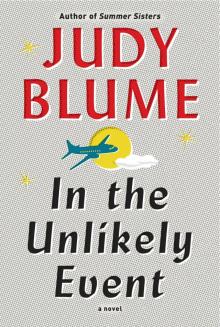 In the Unlikely Event
In the Unlikely Event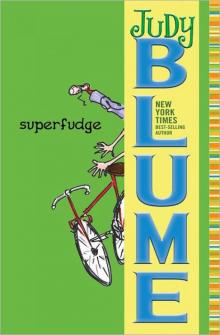 Superfudge
Superfudge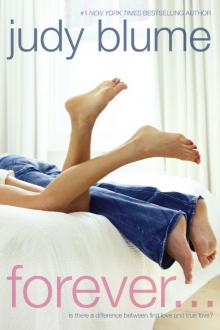 Forever . . .
Forever . . .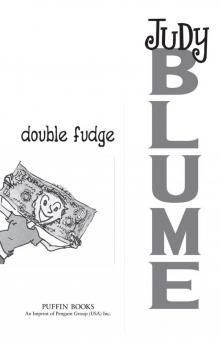 Double Fudge
Double Fudge BFF*
BFF*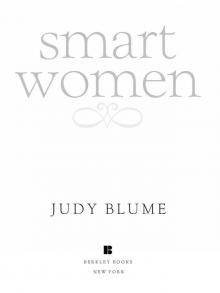 Smart Women
Smart Women It's Not the End of the World
It's Not the End of the World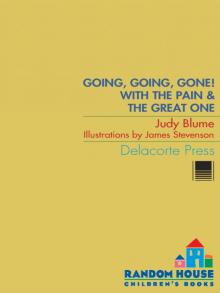 Going, Going, Gone! with the Pain and the Great One
Going, Going, Gone! with the Pain and the Great One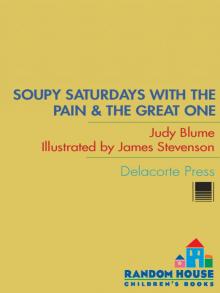 Soupy Saturdays with the Pain and the Great One
Soupy Saturdays with the Pain and the Great One Cool Zone with the Pain and the Great One
Cool Zone with the Pain and the Great One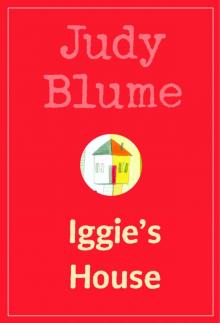 Iggie's House
Iggie's House Friend or Fiend? with the Pain and the Great One
Friend or Fiend? with the Pain and the Great One